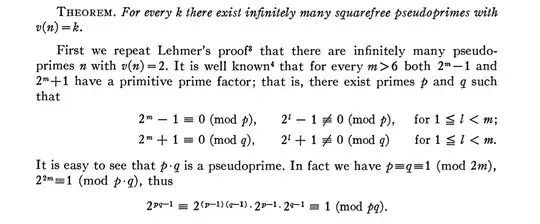Prove that there are infinitely many prime numbers $p$ and $q$ such that $pq\mid2^{pq}-2$.
We may start with some easy steps. By Fermat's Little Theorem, $p\mid2^{p-1}-1$ and $q\mid2^{q-1}-1$.
According to my experience, it is very hard to "construct" prime numbers, so I suppose we may prove by contradiction. However, there are no trivial solutions, the smallest one is $(p,q)=(11,31)$.
Here are all solutions below $1000$.
{11,31}
{17,257}
{19,73}
{23,89}
{23,683}
{29,113}
{31,151}
{31,331}
{37,73}
{37,109}
{43,127}
{43,337}
{53,157}
{59,233}
{71,281}
{73,109}
{73,433}
{89,353}
{89,397}
{89,683}
{97,193}
{97,241}
{97,673}
{101,601}
{103,307}
{127,337}
{137,953}
{149,593}
{151,331}
{151,601}
{157,313}
{167,499}
{193,673}
{229,457}
{241,673}
{251,601}
{257,641}
{271,811}
{307,919}
{337,673}
{401,601}
{433,577}
